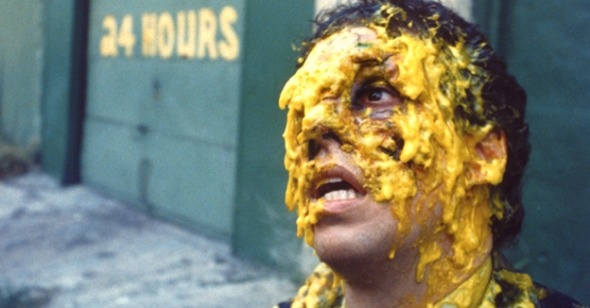Gone to Seed
by Leah Churner
Street Trash
Dir. James Munro, U.S., 1987
James Munro’s Street Trash is a careening, runaway dump truck of gore, raunch, racial slurs, and slapstick whose narrative hinges on a liquor store owner’s scheme to drive away pesky homeless patrons by selling them a discounted case of fetid malt liquor. As it turns out, “Viper” is considerably worse than flat, warm Mickey’s, actually causing people to melt or explode upon consumption or contact; when hobo hero Fred (Mike Lackey) discovers the booze’s retributive potential, he baits his enemies into mugging him for the bottle he keeps in his pocket . . . A cornucopia of subplots, including mafia trouble, Vietnam flashbacks involving vampires, and a burgeoning romance between a teenage runaway and a junkyard lord's sassy secretary, preclude the possibility of a simple synopsis.
The exotic hellhole for this unwieldy period piece is none other than bucolic Greenpoint, Brooklyn, where Muro makes a big local-color to-do about panning away from street signs (Calyer & Lorimer, Norman & Humboldt) and catching the sunset over the East River. In its pre-gentrified state, the neighborhood, devoid of Polish bakeries and modish, post-collegiate emigrants, is a hard-knocks 'hood in which the Mr. Softee trucks have been converted into NYPD paddy wagons for rounding up hookers, and a guy can get whacked just for resembling Rick Moranis.
Muro’s thesis on the societal value of the homeless—alcoholic Vietnam vets in particular—is one of the film's clearer points: poor people are a comic goldmine. The film’s hefty repertoire of shock-and-nausea shenanigans includes time-honored standbys (necrophilia, rape, flatulent hags, lascivious fat people) as well as some impressive inventions, including a whimsical game of keep-away with a freshly lopped human penis and a bulimic cop who kills people, then barfs on their corpses. Adequately rousing, also, are a profusion of dull-razor quips (“You were still doing the backstroke in Dad’s balls, don’t you remember?”) and baffling, awkward threats (“I’ll bite your heart!”). If the memorable dialogue doesn’t do it for you, the floppy tits certainly will.
While James Muro never directed again after Street Trash, Roy Frumkes, who wrote the film, went on to pen The Substitute and its multiple TV and straight-to-video sequels. If anything, Street Trash’s NYC-sleaze vibe best recalls a film that Muro worked on years earlier in the sound department, Frank Henenlotter’s 1982 sickie Basket Case. Set in a height-of-seediness Times Square, the film’s about a kid moving to the big city with only a wad of cash and a wicker basket containing his fleshy lump of a cannibalistic, detached Siamese twin, who comes in handy when protagonist Duane gets into trouble, but makes it hard to adjust to a new life, new therapist, and new girlfriend. Even Basket Case might seem fairly humane in comparison to the insistent vileness of Street Trash, if not for the former film’s climax, a brief scene featuring stop-motion animation so appalling that it obliterates the competition, hands down.
That said, Street Trash’s own finale, hurtling headlong into the credits in a seeming attempt to distract the viewer from the uncomfortable fact that anyone actually had to put their name on this film, deserves kudos for the breadth of its silliness. Unsure of how to end things, the filmmakers dig deep into the shitpile of nonsensical, disparate plotlines and pull out something wholly unexpected, a mafia execution with a corresponding musical number. “We Do It My Way,” an elaborately rearranged version of Sinatra’s “My Way,” sung from beyond the grave by a minor character, is the redemptive Band-Aid that makes it safe to call Street Trash some kind of classic.
